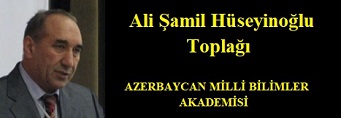Turuz masraflarını karşılaya bilmemiz için yeni yılda Turuza destek olmak için [email protected] ile irtibata geçin.
Bağışlarınızı bu E-postaya bildirin: [email protected]
Bank kart bilgileri:
6104 3373 5031 8547
Iran Millet Bank
Yunus Emre, Yaşamı və qoşuları Yunus Emre hayatı ve şiirleri Yaşamı və qoşuları Latin Ebced Daş Basma
Bu iş latin, əbcəd alfabesində basılmış.Bu kitab əsgi daş basılı yasmanı (nusxə) içərir.
bu kitab yunus əmrəyə görə basılan kitabların ən dəğərli, biçimli, aydın yasmalarındandır.
söz ki gəldi əmrədən, dinməz dilim, sözsüz qalar.
YUNUS EMRE HAYATI VE ŞIIRLERI YAŞAMI VƏ QOŞULARI
یونوس امره حیاتی و شعیرلری - یاشامی و قوشولاری
Latin Ebced Daş Basma
Biçim: PDF
Dil: Türkçe
+
yalnız ebced bölümü-TIKLA
Yunus Emre Qoşuları-Ebced-Daş Basma-1327 Hicr-192s
Yunus Emre has exercised immense influence on Turkish literature, from his own day until the present. Because Yunus Emre is, afterAhmet Yesevi and Sultan Walad, one of the first known poets to have composed works in the spoken Turkish of his own age and region rather than in Persian or Arabic, his diction remains very close to the popular speech of his contemporaries in Central and Western Anatolia. This is also the language of a number of anonymous folk-poets, folk-songs, fairy tales, riddles (tekerlemeler), and proverbs. Like the Oghuz Book of Dede Korkut, an older and anonymous Central Asian epic, the Turkish folklore that inspired Yunus Emre in his occasional use of tekerlemeler as a poetic device had been handed down orally to him and his contemporaries. This strictly oral tradition continued for a long while.[2] Following the Mongolian invasion of Anatolia facilitated by the Sultanate of Rûm's defeat at the 1243 Battle of Köse Dağ, Islamic mystic literature thrived in Anatolia, and Yunus Emre became one of its most distinguished poets. Poems of Sultan Yunus Emre — despite being fairly simple on the surface — evidence his skill in describing quite abstruse mystical concepts in a clear way. He remains a popular figure in a number of countries, stretching from Azerbaijan to the Balkans, with seven different and widely dispersed localities disputing the privilege of having his tomb within their boundaries. His poems, written in the tradition ofAnatolian folk poetry, mainly concern divine love as well as human destiny:
Yunus durur benim adım
Gün geçtikçe artar odum
İki cihanda maksûdum
Bana seni gerek seni.[3]
Yunus is my name,
Each passing day fans and rouses my flame,
What I desire in both worlds is the same:
You're the one I need, you're the one I crave.[4]
Araya araya bulsam izini
İzinin tozuna sürsem yüzümü
Hak nasibeylese, görsem yüzünü
Ya Muhammed canım arzular seni
Bir mübarek sefer olsa da gitsem
Kâbe yollarında kumlara batsam
Mâh cemalin bir kez düşte seyretsem
Ya Muhammed canım pek sever seni
Ali ile Hasan-Hüseyin anda
Sevgisi gönülde, muhabbet canda
Yarın mahşer günü hak divanında
Ya Muhammed canım pek sever seni
"Yunus" senin medhin eder dillerde
Dillerde, dillerde, hem gönüllerde
Arayı arayı gurbet illerde
Ya Muhammed canım arzular seni
| Yunus Emre, Yaşamı və qoşuları Yunus Emre hayatı ve şiirleri Yaşamı və qoşuları- Latin Ebced Daş Basma | |||
|---|---|---|---|
|
خواندن
دانلود
برای ادامه حیات توروز، کمک کنید |
|||
| حجم: 91.71 MB | نوع فایل : Pdf | دیده شده : 1822 | گزارش خرابی |


.jpg)




